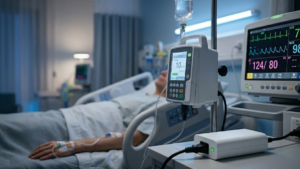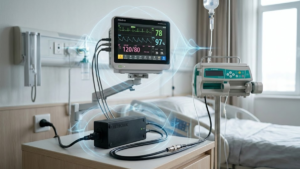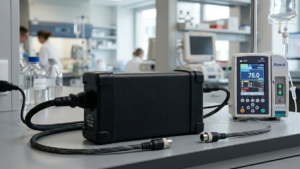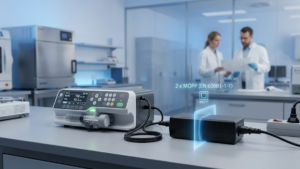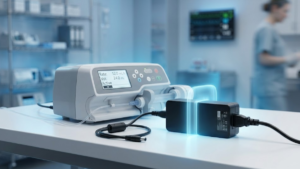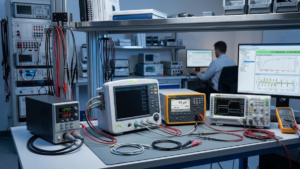In the healthcare sector, reliable and continuous power is not a convenience—it’s a lifeline. From intensive care units to surgical suites, modern medical facilities depend heavily on electrically powered systems. Any disruption in power supply, even for a few seconds, can have catastrophic consequences, jeopardizing patient safety and compromising life-supporting procedures.
This is where Uninterruptible Power Supply (UPS) systems come into play. A well-designed UPS system ensures seamless power backup in case of outages, voltage fluctuations, or grid instability.

1. Why Healthcare Facilities Need UPS Systems
Hospitals and clinics house a wide array of sensitive medical equipment that must remain operational at all times. Examples include:
Ventilators and oxygen concentrators
Patient monitors and infusion pumps
MRI, CT, and X-ray imaging machines
Surgical tools and robotic systems
Diagnostic laboratories
Electronic medical record (EMR) servers
A power interruption could lead to:
Loss of critical data
Shutdown of life-supporting machines
Interrupted surgical procedures
Inaccurate diagnostic results
Delay in patient treatment and response
Therefore, UPS systems are indispensable to provide backup power instantly during a blackout and allow sufficient time to switch to generator power or gracefully shut down systems.
2. Key Roles of UPS in Medical Settings
a) Power Continuity
A UPS provides instantaneous backup power, ensuring that critical systems remain operational without interruption.
b) Power Conditioning
Apart from backup, UPS systems filter and regulate incoming power, protecting sensitive medical devices from:
Voltage sags or surges
Electrical noise
Frequency variations
Harmonic distortion
c) Data Protection
Servers and digital equipment managing patient data benefit from UPS systems by enabling safe shutdown or real-time data preservation during outages.
d) Patient Safety
In ICUs, emergency rooms, and operating theaters, uninterrupted power directly correlates with patient survival and treatment accuracy.
3. Types of UPS Systems Used in Healthcare
There are several UPS architectures, each suited for different levels of power sensitivity and backup duration.
a) Offline/Standby UPS
Provides basic protection
Activates only during a power failure (within milliseconds)
Suitable for non-critical equipment like admin computers
b) Line-Interactive UPS
Offers improved voltage regulation
Switches to battery power when voltage goes outside safe limits
Used for mid-criticality devices, like diagnostic tools and IT equipment
c) Online Double-Conversion UPS
Provides the highest level of protection
Converts AC to DC and back to AC, isolating equipment from raw utility power
Ideal for life-support systems, surgical equipment, and ICU electronics
Hospitals often use a tiered UPS strategy, reserving online UPS for the most critical applications.
4. Regulatory Requirements for Medical UPS Systems
UPS systems in medical applications must comply with a range of international standards to ensure electrical safety, electromagnetic compatibility, and performance reliability. Key standards include:
IEC 60601-1: General safety requirements for medical electrical equipment
IEC 60601-1-2: EMC standards for medical devices
UL 60601-1 or EN 60601-1: Region-specific compliance for UPS used in patient environments
ISO 13485: Quality management systems for medical device manufacturers
Additionally, UPS systems should support 2xMOPP (Means of Patient Protection) insulation requirements when integrated into patient-connected systems.
5. Features to Look for in a Medical-Grade UPS
Selecting a UPS for a hospital or clinic involves more than just power capacity. Here are essential features:
| Feature | Description |
| Low Leakage Current | Prevents accidental electric shocks; crucial for patient-connected devices |
| High MTBF | Ensures long-term reliability under continuous operation |
| Silent Operation | Fanless or low-noise designs suitable for sensitive environments |
| Hot-Swappable Batteries | Allows battery replacement without system downtime |
| Remote Monitoring | Real-time diagnostics and battery status through SNMP, Modbus, etc. |
| Compact Footprint | Especially important in surgical rooms and portable applications |
| Medical Certifications | Compliance with IEC/EN 60601-1 standards |
6. UPS Applications Across Medical Departments
| Department | UPS Usage Example |
| ICU / Emergency Room | Ventilators, defibrillators, patient monitors |
| Operating Room | Anesthesia systems, surgical lights, robotic surgical units |
| Radiology / Imaging | MRI, CT, X-ray machines require high-quality uninterrupted power |
| Clinical Labs | Biochemical analyzers, centrifuges, refrigeration units |
| Administration / IT | EMR servers, billing systems, nurse call systems |
| Home Healthcare | Portable oxygen systems, telemedicine equipment |
Even in outpatient or home-use medical equipment, a compact UPS or backup system ensures consistent operation and patient safety.
7. Challenges and Considerations
Healthcare UPS design is not without its challenges:
Thermal Management: UPS systems generate heat, which must be managed in sterile environments
Battery Life and Maintenance: Regular checks are essential to ensure backup capacity
Scalability: As hospitals expand, UPS systems must be modular or easily upgradable
Integration with BMS: Building Management Systems need UPS integration for centralized control
Working with experienced, medically certified power solution providers is critical to overcoming these challenges.
Conclusion: Power Security is Patient Security
The importance of uninterrupted power in healthcare settings cannot be overstated. From preserving patient data to ensuring life-critical systems remain functional during power failures, UPS systems are a foundational part of modern medical infrastructure.
Medical UPS systems are more than just “power backups”—they are life assurance devices.
Selecting the right UPS system means considering not just power capacity, but also compliance, reliability, patient safety, and long-term serviceability. And that starts with choosing a manufacturer that specializes in medical-grade power solutions.
Quankang: Your Trusted Partner for Medical Power Reliability
At Quankang, we provide certified medical grade power supplies designed specifically for healthcare environments. Whether integrated within UPS systems or used independently for life-support equipment, our products meet the highest global standards, including IEC/EN 60601-1 and 60601-1-2.
Our medical power supply solutions feature:
Ultra-low leakage current for patient-contact safety
Reinforced 2xMOPP isolation for compliance and reliability
High-efficiency and compact design, ideal for UPS integration
Silent, fanless options for ICU, OR, and imaging environments
Customization support for OEM/ODM projects
From hospital-grade ventilators to portable medical stations, Quankang ensures your systems stay powered, stable, and safe—even when the grid fails.
Explore our full range of medically certified power supplies and partner with Quankang to power the future of healthcare—uninterrupted.

